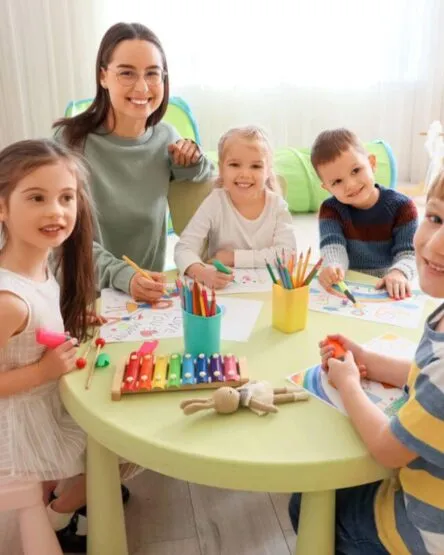How does kindergarten education prepare children for life?
- Builds social skills
- Develops emotional resilience
- Boosts cognitive growth
- Lays the learning foundation
- Encourages independence
Overview
- Kindergarten encourages academic, social, and emotional growth, helping children build essential skills for lifelong success.
- Through play-based learning, they develop literacy, numeracy, and problem-solving abilities.
- Emotional resilience, independence, and strong social connections are nurtured through guided activities.
- Reedley Kindergarten School provides a supportive environment where young learners grow with confidence and curiosity.
Kindergarten marks the start of an exciting adventure where curiosity blooms and friendships take root. It’s more than a classroom — it’s a space where young minds grow, exploring the world through guided learning and playful discovery.
Here, children begin to shape the skills that will carry them through a lifetime of learning. From solving puzzles to sharing stories, they develop confidence, creativity, and the ability to think critically. Along the way, they form connections, learning the art of collaboration and self-expression in a nurturing environment that celebrates every small victory.
Here’s how kindergarten builds life skills and helps set them up for future success.
Builds Social Skills
Friendships blossom, laughter echoes, and essential social skills flourish as children explore their first structured environment. Beyond their family circles, they learn to share, cooperate, and build meaningful connections. These early experiences nurture emotional resilience and provide a solid foundation for lifelong relationships.
Through everyday challenges, children strengthen their critical thinking skills, express their feelings, and embrace different perspectives. Storytelling and play enhance communication skills, encouraging clear expression and social awareness. With each interaction, they grow in confidence and empathy, gaining the tools to navigate school, friendships, and future experiences with curiosity and understanding.
Develops Emotional Resilience
Building emotional resilience is a key example of how kindergarten builds life skills. Everyday situations—like not being picked first in a game, struggling to zip their backpack, or spilling paint during an activity—teach young learners how to manage frustration, try again, and develop patience, confidence, and perseverance.
Every new environment, routine, and friendship offers young learners a chance to build resilience — a skill that will support them through life’s challenges. Kindergarten becomes a space where emotions are explored, understood, and embraced. Through storytelling, role-playing, and heartfelt discussions, children learn to express their feelings and recognize those of others.
Teachers play a guiding role, introducing simple yet powerful coping tools like deep breathing and positive self-talk. With each lesson, children grow more confident in managing their emotions. These early experiences lay the groundwork for navigating both academic and personal hurdles with strength and resilience.
Boosts Cognitive Growth
Early childhood is a time of rapid cognitive growth, shaping how children learn, reason, and think critically. Kindergarten offers a dynamic environment where young minds explore and grow through hands-on activities, puzzles, and group projects.
At Reedley Kindergarten, we nurture curiosity through inquiry-based learning, encouraging children to ask questions and seek solutions. Early literacy, numeracy, and problem-solving skills are introduced, building a strong foundation for academic success. By engaging in meaningful experiences, children develop confidence, resilience, and the critical thinking abilities needed to thrive in school and beyond.
Lays the Learning Foundation
Kindergarten introduces children to fundamental concepts in reading, writing, and mathematics, laying the groundwork for future academic success. During this stage, children learn to recognize letters, understand phonics, and develop essential counting skills—all of which are critical for their ongoing education.
Activities that strengthen motor skills such as building with blocks or engaging in outdoor play also play a key role in a child’s development. These activities enhance physical coordination, which supports both academic performance and overall well-being.
At Reedley, we offer a well-rounded curriculum that integrates academic learning with social and emotional development. Through play-based learning, children explore concepts in a fun and engaging way, fostering curiosity and a lifelong love for learning. By creating a stimulating and supportive environment, Reedley Kindergarten School ensures that young learners are prepared not just academically but holistically for future success.
Encourages Independence
When children take on tasks independently, they experience a sense of accomplishment that builds confidence and encourages them to embrace new challenges. Problem-solving on their own reinforces self-belief, nurturing resilience and a passion for learning.
Developing independence also motivates critical thinking. As children make choices and consider outcomes, they strengthen decision-making skills essential for adulthood. Managing time and responsibilities in kindergarten further prepares them for the structure of school and beyond.
Key Takeaway
Understanding how kindergarten prepares your child for life highlights its crucial role in shaping their academic, social, and emotional growth. The skills they develop during this stage will equip them with the confidence and independence needed to succeed in school and beyond.
Give your child a strong foundation for lifelong success at Reedley Kindergarten School. Reach out to us today to learn how our programs nurture essential skills for growth and development!
